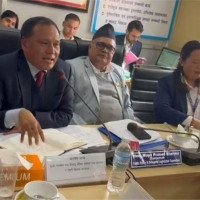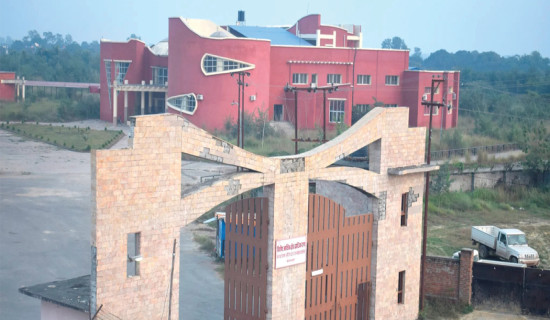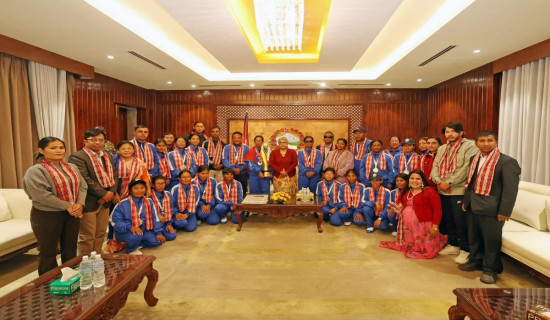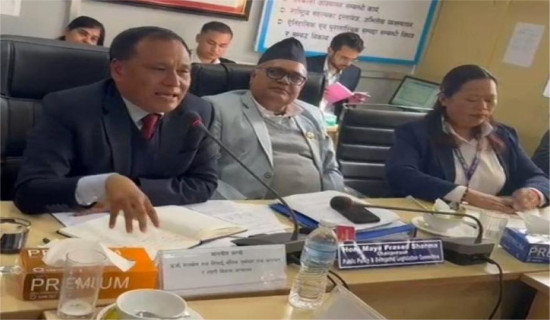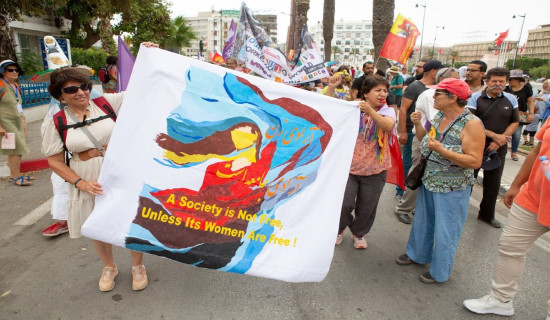- Monday, 24 November 2025
Theatre portrays harsh reality of Cyber Violence against Women and Girls
Kathmandu, Nov 24: "My father will kill me if he finds out. It would be better if I ended my life before he comes to know."
These chilling words, spoken by a 17-year-old college girl during a theater performance, leave the audience deeply moved. The play, part of a programme on Addressing Digital Violence against Women and Girls, highlighted the trauma faced by young women in real life.
In the performance held in Lalitpur on Monday, the girl narrates that she was blackmailed by a trusted friend who had encouraged her to join a college trip and even funded it. Later, he edited her photos taken during the tour and created private videos using AI, pressuring her to spend time with him in a hotel. When she refused, he threatened to circulate the AI-edited contents in the social media.
The girl had no idea what to do next and further panicked when she remembered that her father, who was also abusive, would likely punish her rather than support her in coping with the situation.
Although a dramatization, stakeholders said the story reflects a grim reality in our society.
Police Inspector Deepa Bhattarai of the Cyber Bureau, Nepal Police, said such incidents are common. “The case presented in the drama closely mirrors real cases registered with the Bureau. Survivors are encouraged to seek legal remedies, and open discussion is crucial to addressing the trauma the victims face, she said.
Highlighting the Bureau’s statistics, Inspector Bhattarai added, “Women and girls make up 50% of cybercrime survivors. Last fiscal year, of 8,400 cases registered, half were filed by women and girls. The forms of violence may differ for men, but cases against women and girls are often more serious.”
FLWD advocate Sabin Shrestha highlighted that male dominance and excesses are increasingly evident online as well. “Digital platforms have become spaces where violence against women and girls is both perpetrated and amplified,” he said, pointing out lapses in the proposed Social Network (Media) Bill and the IT and Cyber Security Bill. As gender perspective has been missing in these drafts, there is urgent need to revise the drafts through a gender lens to help reduce gender disparities and combat gender-based discrimination in digital spaces. “Gender-based violence disproportionately affects girls and women,” he added, calling for introducing and implementing a dedicated act soon. As he said, the Electronic Transaction Act-2008 is insufficient to address the aforementioned issues.
Officiating Secretary at the Ministry of Communications and Information Technology, Uday Bahadur Ranamagar, stated that the Ministry is highly sensitive to the digital safety of women and girls and is taking appropriate measures to address it.
Participants also stressed the importance of linking discussions on digital gender-based violence to its impact on mental health, as well as on the family and social integration of survivors.
In her concluding remarks, Sancharika Samuha President Kamala Panthi was of the view that girls and women are more vulnerable to digital violence which are varied in forms and nature and this statement is supported by data from the Nepal Police Bureau. Survivors are often denied proper access to justice. When a girl or woman affected by such violence decides to speak out, she is at high risk of being digitally trolled and caught in a vicious cycle of online abuse, which adds further trauma, according to her.
“This reflects our society, calling for urgent committed action and legislation to address the growing digital violence against girls and women in the country." (RSS)




